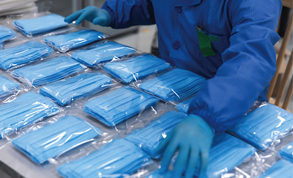News review - December 2020
We know more than four million patients are on waiting lists for elective care in England, with nearly 140,000 waiting for more than 52 weeks. Around 46% of all the patients had been waiting for more than the 18-week target. The NHS is doing its best to tackle this, increasing services in line with the recovery plan set out by NHS England and NHS Improvement. However, this will be made more difficult if there is a continuing surge of Covid-related admissions.
As US politician Donald Rumsfeld said, there are known knowns and known unknowns. He was widely ridiculed, but the statement could be applied to NHS waiting times. The service knows it has a backlog of patients, as laid out in waiting times figures. And it suspects there is a hidden backlog (a known unknown) due to Covid. The Health Foundation has tried to put a figure on the hidden patients, suggesting it could more than double the number on the waiting list. The foundation said 4.7 million fewer people were referred for routine hospital care between January and August this year. The NHS and government must plan to tackle both the hidden backlog and the known waiting list, the Health Foundation said. NHS England has invited independent sector providers to bid to join a waiting list framework agreement worth £10bn over four years.
Funding is critical to the response to Covid, winter pressures and the backlog. Ministers in Northern Ireland announced that health and personal social services would receive more than £500m in additional funding this year to bolster the response to Covid-19. As well as almost £527m in resource spending, the Department of Health will also receive an additional £32m in capital funding for Covid-related costs. Finance minister Conor Murphy said the health funds would help the response to the public health emergency, including enhancing test, trace and isolate systems. Trusts have been instructed to provide free car parking for staff until the end of the financial year.
 Much of the public spending on Covid has been used to procure personal protective equipment (PPE), but the National Audit Office found issues with PPE procurement in the early months of the pandemic. While an NAO report recognised the exceptional circumstances in the period up to 31 July, it said standards of transparency and documentation were not met consistently at government level. However, the auditors did not find any wrongdoing by ministers.
Much of the public spending on Covid has been used to procure personal protective equipment (PPE), but the National Audit Office found issues with PPE procurement in the early months of the pandemic. While an NAO report recognised the exceptional circumstances in the period up to 31 July, it said standards of transparency and documentation were not met consistently at government level. However, the auditors did not find any wrongdoing by ministers.
A huge IT deal could be on the horizon for the NHS in England, which is examining the feasibility of giving more than 450 organisations an integrated HR and finance system. Companies have been invited to take part in a survey on the viability of providing an enterprise resource planning (ERP) solution for the NHS in England. The ERP would combine the electronic staff record and finance systems, providing a replacement for the integrated single finance environment used by commissioners. The integrated system would be complex and potentially expensive too, and the study is expected to report on recommendations for next steps in January.
However, the Department of Health and Social Care and the NHS received a warning on IT projects in general. The Commons Public Accounts Committee said the health bodies have not learnt from almost two decades of failed IT programmes, including the paperless NHS, which was delayed and ‘watered down’, and the ‘expensive and largely unsuccessful’ national IT programme between 2002 and 2011. The Department and the NHS had none of the components needed to deliver their digital ambitions – effective governance, realistic and detailed plans, sufficient investment both nationally and locally, and clear accountability.
Welsh health and social services minister Vaughan Gething outlined a programme of financial support for Betsi Cadwaladr University Health Board, which has now been removed from special measures. Mr Gething told the Senedd it had made some improvements. The support package will operate over three years from 2021/22. It includes: up to £40m a year to cover the board’s deficit; £30m a year to improve unscheduled care and build a sustainable planned care programme; and £12m a year to support mental health and to increase capability and capacity.
 The Scottish Budget will be held on 28 January, the Holyrood government announced. It took the decision after UK chancellor Rishi Sunak postponed his Budget until the new year. Scotland’s finance secretary Kate Forbes said this would allow time to digest the effect of the one-year spending review, take stock of the Covid situation, and the outcome of negotiations on a trade deal with the European Union. However, the Scottish Ambulance Services has been allocated an additional £11m to improve its capacity and resilience over the winter.
The Scottish Budget will be held on 28 January, the Holyrood government announced. It took the decision after UK chancellor Rishi Sunak postponed his Budget until the new year. Scotland’s finance secretary Kate Forbes said this would allow time to digest the effect of the one-year spending review, take stock of the Covid situation, and the outcome of negotiations on a trade deal with the European Union. However, the Scottish Ambulance Services has been allocated an additional £11m to improve its capacity and resilience over the winter.
Related content
We are excited to bring you a fun packed Eastern Branch Conference in 2025 over three days.
This event is for those that will benefit from an overview of costing in the NHS or those new to costing and will cover why we cost and the processes.